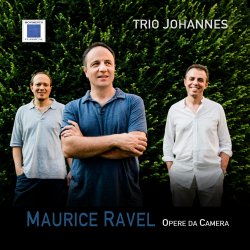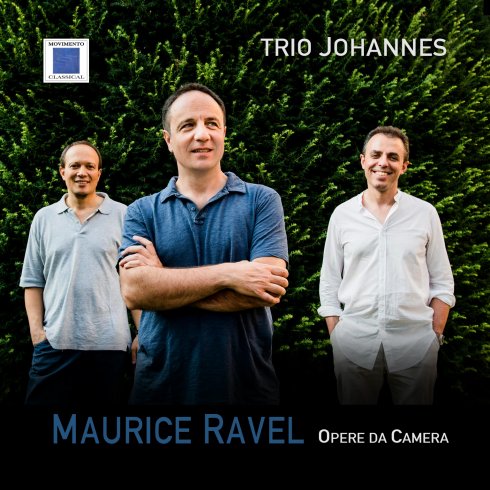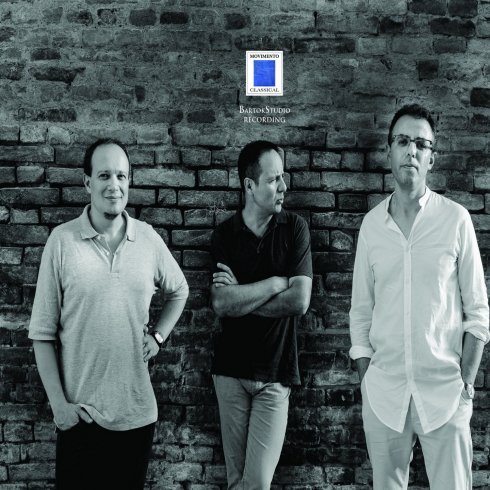

Opere da Camera
“I believe this sonata marks a tuming point in the evolution of my career. The dispossession is pushed lo the extreme and involves the renunciation of the charmof harmony and an increasingly pronounced orientation in the direction of the melody”. After the iliuminating words of Maurice Ravel, in his Esquisse autobiographique. I do noi think it is necessary to add much more to teli this amazing Sonate for violin and cello which cosi the author more than a year and a hall off work.
The renunciation of harmony and its seduction, a self-limitation operated by composing only two voices to privilege the intertwining between the two ìnstruments (at times hardly distinguishable in the hìgh register, the celio part ìs in fact extremely difficult to play) creating a•melodie labyrinth", as Restagno suggests in his fundamental text on Ravel (1). A sort of contrapuotal distillate where each note lives and moves as a duo with another singlevoice: Duo was in fact also the first title of the Sonata, whose first performance took place on Aprii 6, 1922 with interpreters Hélène Jourdan Morhange on violin and Maurice Maréchal on the cello. In Ravel's letters we find news of tlhe Sonate for violin and piano from January 1924, but the Author completed it only in April 1927. Ravel had already composed a sonata tor this ensemble in the early years of the Conservatory, in the composition class by Gabriel Fauré, bui he did noi consider to include it in his catalogue and was only publlshed in 1975 with the tille of Sonate posthumous. The first movement is based on two man themes of great beauty and lyricism, the tirsi almost drawn as a sweet and sinuous outline of hills, the second, more archaic and static, thanks to the empty fifths of the piano that create an arcane atmosphere under the almost poignant theme of the violin. To shore up the whole first hall in continuos intertwining between violin and piano, however, is the idea that represents the nostalgia tor the French country side felt by the author during a voyage by ship to England and which is detined by Ravel himself similar to a "Chicken verse•: a very rhythmic, almost onomatopoeic incision thanks to the use of an "acciaccatura". The second movement is a Moderato which Ravel will call Blues, revealing with this choice the ìnfluences of African American music from aoross lhe ocean that had largely contaminated European musical taste.
The violin begins almost like a banjo, plucking chords with staggered accents while the piano, alter many bars of waiting, plays an empty fiflh on the bass, solitary and enigmatic (see the second theme of the first movement) and even lower, a dottet rhythm appears which immediately gives the song the swing. The violin then seems to improvise a jazz melody, complete with glissandi and searches for not exactly pure and uncontaminated sounds. The third and last movement is a further twist after the unbridled imagination and expressivenss of the Blues we have a highly effective Perpetuum mobile, with sensational and arduous arpeggios very fast musical scales, repeatednotesof the v1olinwhile the piano , againwithasort ofaplomb almost creating adistance between the two instruments, it will propose elements that have a lot in common with the rhythmic and thematic materiai of the two previous movements.


TRIO JOHANNES
The “Trio Johannes” was born in 1993 from the encounter of the cellist Massimo Polidori with the duo composed by Francesco Manara and Claudio Voghera, already engaged for some years in the deepening of chamber music repertoire and guest of the main concert institutions.
The three musicians individually boast important successes: Francesco Manara was chosen by Riccardo Muti to take the position of first violin soloist in the Orchestra del Teatro alla Scala in Milan and in 1993 he won the First Prize at the Geneva International Competition; Massimo Polidori after winning the First Virtuosity Prize of the Geneva Conservatory, holds the position of First Cello in the Orchestra del Teatro alla Scala in Milan; Claudio Voghera, principal piano teacher at the Conservatory of Turin, a former student of Aldo Ciccolini, in 1993 he won the "Grand Prix de Sonates Violon et Piano" of the Lausanne Academy.
Thanks to a scholarship from the "De Sono Associazione per la Musica", the Trio Johannes studied at the Chamber Music International Higher School of the “Trio di Trieste”, with the Maestros De Rosa, Zanettovich and Baldovino, achieving in 1995 the Diploma of Merit.
Since then the trio has been a guest of important concert companies such as, among others, “gli Amici della Musica” of Padova, Vicenza, Florence and Perugia, the Bologna Festival, the Gog of Genova, Unione Musicale of Turin and the “Radio della Suisse Romande” in Geneva; In May 2000 the trio made a tour in South America organized by Cidim playing in the main concert halls of Argentina, Uruguay and Brazil. Thanks to a project supported by the “Amici della Musica” of Vicenza, the trio recorded its first CD with music by Beethoven and Brahms for the “Sicut Sol" record label .
The trio boasts important successes at international level: in 1998 the II Prize at the "III Concorso Internazionale Premio Trio di Trieste", in 1999 the II Prize at the "3rd International Chamber Music Competition" in Osaka; in 2001 it was also the winner of the "50th Concert Artists Guild Competition" in New York and has made its debut in the United States in the 2002 season, playing for major concert companies including Carnegie Hall’s Weill Recital Hall in New York, the Pittsburgh Chamber Music Society and the Market Square Concerts of Harrisburg.
